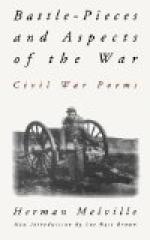Sunday at Shiloh, and the day
When Stonewall charged—McClellan’s
crimson May,
And Chickamauga’s wave of death,
And of the Wilderness the cypress wreath—
All these have passed away.
The life in the veins of Treason lags,
Her daring color-bearers drop their flags,
And yield. Now shall we fire?
Can poor spite be?
Shall nobleness in victory less aspire
Than in reverse? Spare Spleen her ire,
And think how Grant met Lee.
The Muster:[17]
Suggested by the Two Days’ Review at Washington
(May, 1865.)
The Abrahamic river—
Patriarch of floods,
Calls the roll of all his streams
And watery mutitudes:
Torrent cries
to torrent,
The
rapids hail the fall;
With shouts the
inland freshets
Gather
to the call.
The quotas of the Nation,
Like the water-shed
of waves,
Muster into union—
Eastern warriors,
Western braves.
Martial strains are mingling,
Though distant
far the bands,
And the wheeling of the squadrons
Is like surf upon
the sands.
The bladed guns are gleaming—
Drift in lengthened
trim,
Files on files for hazy miles—
Nebulously dim.
O Milky Way of armies—
Star rising after
star,
New banners of the Commonwealths,
And eagles of
the War.
The Abrahamic river
To sea-wide fullness fed,
Pouring from the thaw-lands
By the God of floods is led:
His deep enforcing
current
The
streams of ocean own,
And Europe’s
marge is evened
By
rills from Kansas lone.
Aurora-Borealis.
Commemorative of the Dissolution of Armies at the
Peace.
(May, 1865.)
What power disbands the Northern Lights
After their steely play?
The lonely watcher feels an awe
Of Nature’s sway,
As when appearing,
He marked their flashed uprearing
In the cold gloom—
Retreatings and advancings,
(Like dallyings of doom),
Transitions and enhancings,
And bloody ray.
The phantom-host has faded quite,
Splendor and Terror gone—
Portent or promise—and gives way
To pale, meek Dawn;
The coming, going,
Alike in wonder showing—
Alike the God,
Decreeing and commanding
The million blades that glowed,
The muster and disbanding—
Midnight and Morn.
The Released Rebel Prisoner.[18] (June, 1865.)
Armies he’s seen—the herds of war,
But never such swarms of men
As now in the Nineveh of the North—
How mad the Rebellion then!
And yet but dimly he divines
The depth of that deceit,
And superstition of vast pride
Humbled to such defeat.
Seductive shone the Chiefs in arms—
His steel the nearest magnet drew;
Wreathed with its kind, the Gulf-weed drives—
’Tis Nature’s wrong they rue.




